
Vincent van Gogh Le moulin de la galette 1886

The news about Powel’s first speech is as boring as the man himself. “We’re doing so well I just gotta wear shades..”
• Fed Chairman Powell: Market Volatility Won’t Stop More Rate Hikes (CNBC)
Federal Reserve Chairman Jerome Powell played down concerns about recent market volatility, arguing Tuesday that the dramatic swings do not weigh heavily on his outlook for the economy and maintaining his expectation for further gradual increases in interest rates. In Capitol Hill testimony, Powell emphasized that the job market remains robust, consumer spending is solid and wage growth is accelerating. He also highlighted gains in U.S. exports and stimulative fiscal policy as new “tailwinds” for the economy. “After easing substantially during 2017, financial conditions in the United States have reversed some of that easing,” he said in prepared remarks. “At this point, we do not see these developments as weighing heavily on the outlook for economic activity, the labor market and inflation. Indeed, the economic outlook remains strong.”
Powell’s appearance before the House Financial Services committee was his first as the powerful chairman of the world’s most influential central bank. The Fed has been aiming to boost inflation to 2%, but the recent pickup in monthly readings has spooked some investors who worry the central bank might overshoot its target. Instead, Powell’s remarks suggested the firmer data give Fed officials confidence they will actually hit a goal that has long proved elusive. He characterized inflation as “low and stable.” “Despite the recent volatility, financial conditions remain accommodative. At the same time, inflation remains below our 2% longer-run objective. In the FOMC’s view, further gradual increases in the federal funds rate will best promote attainment of both of our objectives.”

Stockman has the best assessment of Powell. A longtime and clueless Fed puppet with no opinion of his own.
• The Albatross Of Debt Part 4 (David Stockman)
Donald Trump is all about delusional and so are the casino punters. They keep buying what the robo-machines are buying, which, in turn, persist in feasting on the dip because it’s there and because it’s worked like a charm for nine years running. So doing, the punters have become downright reckless. After all, the market was already sky high last January – trading at 23X earnings on the S&P 500 and resting precariously on a record $554 billion of margin debt . Yet in order to load up on even more of these ultra risky shares, punters have since added $112 billion to their already staggering margin accounts, thereby helping to propel the S&P index to a truly ludicrous 27X by the end of January 2018.
And therein lies the true danger of the Fed’s 30-year long regime of Bubble Finance and the $67 trillion of debt it has piled upon the US economy. To wit, it has completely unmoored Wall Street from the main street economy, meaning that the speculative momentum and internals of the casino are operating in free flight: They will just keep levitating financial asset prices higher until some powerful shock triggers another meltdown of the type experienced during 2008, 2000 and 1987.
We happen to believe strongly that a bond market “yield shock” will be the crash-trigger this time around and for a self-evident reason. The central banks of the world have unleashed a credit monster – $67 trillion in the US, $40 trillion or more in China and $230 trillion on a global basis—and know they must finally stop the relentless monetization of existing debt and other assets. The leadership for that task falls to the new Fed Chairman, Jerome Powell, who is a dyed-in-the-wool Keynesian and lifetime crony capitalist bubble rider. Indeed, during the 45 meetings during which he served as a member of the Bernanke-Yellen Fed, he did not dissent a single time.
So he now owns the epic bubble generated by that madcap regime of massive money printing and drastic interest rate repression, but through his Keynesian beer goggles Powell is thoroughly clueless about the resulting giant disconnect between main street and Wall Street. Accordingly, he seems to think that there is a strong full-employment economy on main street, when it’s nothing of the kind; and a reformed, prudently regulated banking system at the center of Wall Street, when in fact it’s teeming with the fruits of relentless speculation – FANGS, leveraged ETFs, options gambling, risk parity trades, structured finance deals loaded with hidden risk and debt and countless more.`
In other words, the Fed’s new chairman avers that there is smooth sailing ahead, even suggesting to Congress today that the US economy is blessed with considerable tailwinds – including exports and fiscal policy! We will address that tommyrot below, but what’s ahead is tumult, not smooth. That’s because the disconnect between a flat-lining main street economy and Wall Street’s bubble ridden financial house of cards is blatantly unstable and unsustainable. Indeed, this fraught condition, which Powell and his Keynesian posse fail to see, will soon give rise to a thundering upheaval triggered by the Fed’s own action.

And Draghi too just keeps claiming the economy is doing great, and it’s due to him.
• Slowing Euro-Area Inflation Helps Draghi Push Back Exit Debate (BBG)
A third month of slowing inflation in the euro-area has given European Central Bank President Mario Draghi ammunition to ward off the hawks a little while longer. The rate of price growth slowed to 1.2% this month from 1.3%, dropping to its weakest since 2016. The core measure was unchanged at 1%. The figures follow a series of releases that have checked the economy’s thundering momentum at the start of 2018, which had emboldened policy makers who want a faster unwinding of the central bank’s crisis-era monetary stimulus. Draghi emphasized to European lawmakers this week that an expansionary policy is still warranted even as the economic situation is “improving constantly.”
At the same time, he’s more confident that declining unemployment will boost pay and inflation eventually, even if the rate remains below the ECB’s target of just under 2% for now. The ECB’s Governing Council meets next week and is likely to discuss a change in its policy language to pave the way for an end of quantitative easing. Executive Board member Benoit Coeure – an architect of the program who has more recently taken a hawkish turn – said last week that the ECB can afford to slow bond purchases, as long as it gives clear guidance on the path of interest rates. Bundesbank President Jens Weidmann, who has long argued in favor of unwinding stimulus, chimed in on Tuesday, saying in a Bloomberg TV interview that the ECB’s guidance on interest rates is “rather vague” and could be strengthened as the end of bond buying approaches.
The European Commission said on Tuesday euro-area economic sentiment slipped for a second month in February after touching a 17-year high in December. Data last week showed business confidence in Germany and manufacturing and services activity in the euro area all weakened more than economists forecast. Such bumps along the road of Europe’s recovery from the ravages of its debt crisis underscore why Draghi is not yet ready to pare back support for the euro area.
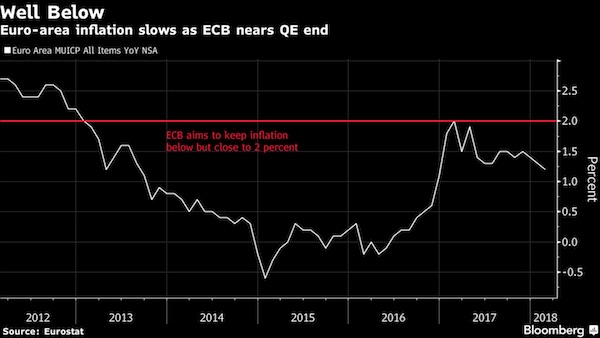

You mean the ones we bailed out, right?
• Banks Have The Right To ‘Do What They Want’ In Leveraged Lending: Otting (R.)
Banks have the “right” to do the leveraged lending they want as long as it does not impair their “safety and soundness,” Joseph Otting, Comptroller of the Currency, said on Tuesday. Otting was speaking to an audience at the ABS Vegas conference co-hosted by SFIG, in response to a question from the audience about whether the OCC would be more lenient with banks about leveraged lending. The Government Accounting Office, the investigative arm of the US Congress, said last October that US bank guidelines on leveraged lending are subject to Congressional review, clearing the way for them to possibly be overturned. The GAO said the guidelines, which critics said have hampered the leveraged debt market, are under the purview of the Congressional Review Act of 1996, which they would not be if the GAO had deemed them to be less formal instruments of policy.
“As long as banks have the capital, I am supportive of banks doing leveraged lending,” said Otting. That stands even if leveraged lending activities transgresses guidelines, he said. “When (the idea of the) guidance came out – it was like people were afraid to jump over the line without feeling the wrath of Khan from the regulators,” Otting said. “But you have the right to do what you want as long as it does not impair safety and soundness. It’s not our position to challenge that.” US regulators said they are open to revising restrictions on leveraged lending, offering an olive branch to a Republican-controlled Congress keen to roll back banking regulations. The response from regulators indicated a desire to avoid a protracted battle with a Congress.

Trump the anti-globalist. That should appeal to some people.
• EU and China Consider Retaliation To Potential Trump Tariffs (CNBC)
As the Trump administration considers what action to take on trade tariffs on steel and aluminum, EU and Chinese officials are considering taking aim at politically strategic products made in the U.S., such as bourbon and motorcycles. Of the options laid out by Commerce Secretary Wilbur Ross, the administration is considering the most wide-reaching penalty: slapping tariffs on all steel and aluminum imported into the U.S., not just imports from specific countries. The EU is targeting products with political punch, revisiting a list compiled during George W. Bush-era trade disputes of symbolic American brands. Potentially in the EU’s sights: items such as Harley-Davidson motorcycles, whose corporate headquarters is in House Speaker Paul Ryan’s home state of Wisconsin.
Bourbon is another target, having enjoyed a surge in exports to the EU. Senate Majority Leader Mitch McConnell’s home state of Kentucky exported $154 million worth of bourbon to the EU, up from $128 million in 2016, according to data from the International Trade Commission. Agriculture products such as cheese, orange juice, tomatoes and potatoes are also targets for retaliation. “The EU stands ready to react swiftly and appropriately in case our exports are affected by any restrictive trade measures from the U.S.,” a European Commission source tells CNBC. The counterpunch from China could land harder because of the scale of trade between the two countries and the reliance of American farmers on China as an export destination. China’s Ministry of Commerce is already investigating whether to limit imports of U.S. sorghum, a cereal grain used to feed livestock, in response to previous tariffs from the White House on solar panels and washing machines.

NOW they find out: “Cash is important in a crisis situation…”
• People in Sweden at Risk of Losing Access to Cash Altogether (BBG)
People living in the world’s most cashless society may soon lose their access to notes and coins. To avoid that extreme scenario, Swedish cash-handling provider Loomis wants authorities to force banks and retailers to continue accepting cash. The warning follows similar calls from the Swedish central bank, which is worried that the rapid disappearance of cash will ultimately lead to the disintegration of the infrastructure needed to use notes and coins and undermine its task to promote a safe and efficient payment system. “We have to have cars, vaults and all that, and in order to maintain the infrastructure we also need a base volume,” Loomis CEO Patrik Andersson said in an interview. He says Sweden’s more remotely populated areas in the north are most at risk of losing access to cash.
Such a scenario would be worrying in the event of natural disaster or a technological breakdown, with Swedes potentially unable to buy the basics needed to survive. “Cash is important in a crisis situation,” Andersson said. “Swedes don’t maybe have the insight to understand the effects of such a crisis, that it pervades the whole community.” A parliament committee reviewing the broader framework for the Riksbank plans to publish a special report this summer looking at the challenges posed by declines in cash usage. Riksbank Governor Stefan Ingves this week called for legal changes to safeguard the central bank’s governance of the payment system amid the rapid decrease in the use of cash. [..] The amount of cash in circulation in Sweden last year dropped to the lowest level since 1990 and is now more than 40% below its 2007 peak. The declines in 2016 and 2017 were the biggest on record.
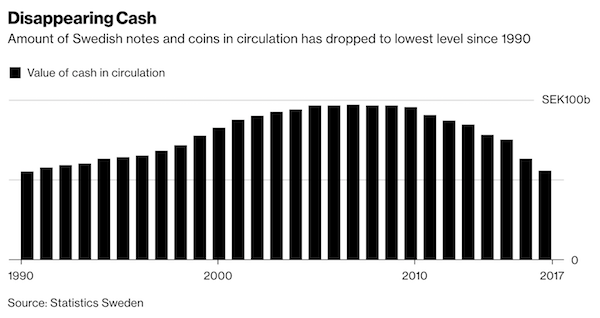

Much as you may wish this were to vanish from the news, it’ll drag on for a very long time.
• May Is Ready to Fight With EU Over Draft Brexit Deal (BBG)
Prime Minister Theresa May is preparing to reject the EU’s draft Brexit deal when it’s published Wednesday, a senior official said, as her government steps up its fight with the bloc over the terms of Britain’s departure. With just three weeks left to agree on the Brexit transition phase, the EU will unveil a legal text that’s likely to infuriate euroskeptics in May’s Conservative government, piling further pressure on the premier at a critical time. According to the senior official, May will take on the EU over two of its key proposals that are unacceptable to her government. These are allowing the European Court of Justice to oversee the final deal, and arranging a separate trading regime for Northern Ireland – which, although it could avoid a “hard border” with Ireland, would impose new barriers with mainland Britain.
Almost a year in since May triggered the U.K.’s withdrawal from the 28-nation club, talks have yet to begin on what kind of trade accord will follow. Time is running out to limit the damage this ongoing uncertainty will cause to British businesses, who want a status quo transitional phase to be agreed by the end of March at the latest, to help them prepare and adapt when Britain leaves in March 2019. Yet key conflicts remain unresolved between the U.K. and the EU negotiating teams. “I maintain the evaluation that I gave you three weeks ago, which is that in light of these divergences, that we haven’t achieved the transition,” EU chief negotiator Michel Barnier said Tuesday. His remarks raise the prospect that the deal will miss its crucial end-March deadline.

Caitlin Johnstone has it right. It’s out leadership that has turned Syria into such a mess (like Lybia, Iraq), not Assad or Putin.
• “We’ve Got To DO Something About Syria!” Uh, No You Don’t. Please Don’t. (CJ)
Arguing that the western war machine is a good way to bring about peace and justice is like arguing that a bulldozer is a useful tool for brain surgery. Arguing that the western war machine is a good way to bring about peace and justice in Syria is like arguing that the gasoline which was used to start a house fire can also be used to extinguish it. The cutesy fairy tale you will hear from empire loyalists is that what started out as peaceful protests slowly morphed into a battle between the Syrian government and various terrorist factions, with the west only backing the terrorists later on in the conflict. This is false. [..] This has never been about “saving children”; this is about money, power, and resources, which are all of course ultimately the same thing as far as the empire is concerned.
Longtime US rival Russia has recently been awarded exclusive rights to oil and gas production in Syria in return for its efforts in helping its longtime ally stop the regime change, a predictable step in the fight for fossil fuel dominance in the region. Syria’s border dispute with Israel over the Golan Heights means that Israel has every reason to want to keep Syria destabilized, not only because the Golan Heights contains oil but because it provides a third of Israel’s water supply. Bashar al-Assad also launched what he called his “Five Seas Vision” in 2004, a strategy to use Syria’s supreme geographic location to become an economic superpower. Such a plan wouldn’t sit well with the US hegemon, which can only maintain its dominance by keeping other nations down.
“Once the economic space between Syria, Turkey, Iraq and Iran becomes integrated, linking the Mediterranean, the Caspian Sea, the Black Sea and the Arabian Gulf, will not only be important in the Middle East,” Assad once famously said in 2009. “When these seas are connected, we will become the inevitable intersection of the whole world in investment, transportation, and more.” It’s not hard to imagine how the imperialists would suddenly accelerate the urgency of removing Assad once he began speaking like that. Go try and find anything damning about Bashar al-Assad in the western mainstream media prior to 2009. You’ll find a bunch of positive expressions, including a nomination for honorary knighthood in 2002 by British Prime Minister Tony Blair. Interesting how he then suddenly transformed overnight into a bloodthirsty sexual sadist who gets off on gassing children to death for no reason.

The name dispute continues. Came upon a map recently (below), which explains quite well why Greeks don’t want FYROM to call itself Macedonia: 90% of former Macedonia is in Greece.
• Protesters in FYROM Decry Proposed ‘Macedonia’ Name Compromise (AP)
Several thousand protesters rallied in Skopje, the capital of the Former Yugoslav Republic of Macedonia (FYROM), late Tuesday for the government to call off talks with Greece aimed at settling a decades-long name dispute. The protesters marched peacefully from the main Orthodox cathedral in Skopje past the European Union office, chanting “Macedonia! Macedonia!” and waving national flags. Prime Minister Zoran Zaev’s 9-month-old center-left government has opened negotiations with Greece to resolve the dispute over the country’s name. Greece says the country’s name in its current form implies a territorial claim against its own region of Macedonia. Zaev has said he is willing to support a modified name. But the head of the so-called “World Macedonian Congress” group, Todor Petrov, told the protesters that changing the country’s name would be tantamount to committing treason.
“Our country has a name….To change it would mean that the Macedonian identity would be permanently lost,” he said. The rally was organized by several hard-line nationalist associations. The rally ended peacefully, but a Greek flag was burned during the march. Greeks also held a large rally in Athens earlier this month to reject a proposed compromise. Zaev has said he could accept a “geographical qualifier” in Macedonia’s name – such as “new”, “upper” or “north” – to forge a compromise, but insisted the new name must “respect the dignity” of people in both countries. Greece is also seeking changes in FYROM’s Constitution to eliminate what Athens considers tacit territorial claims. FYROM insists constitutional amendments made in 1995 already addressed Greek concerns.
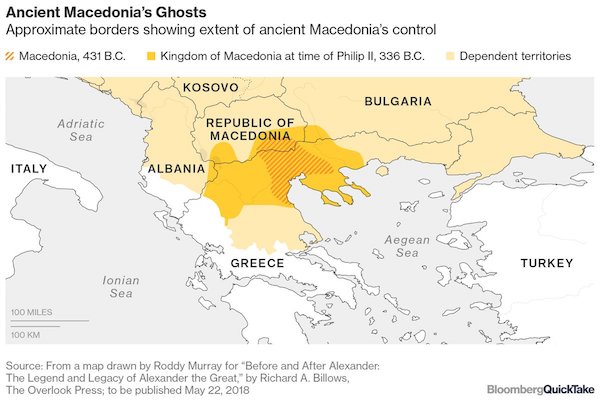

1) It’s crazy that we find this so special.
2) Shops have had plastic free aisles for many years, and in many places. Just not your supermarket.
3) That unfortunate photo makes it look as if everything is wrapped in plastic.
• World’s First Plastic-Free Aisle Opens In Netherlands Supermarket (G.)
Shoppers in the Netherlands will get the chance to visit Europe’s first plastic-free supermarket aisle on Wednesday in what campaigners claim is an turning point in the war on plastic pollution. The store in Amsterdam will open its doors at 11am when shoppers will be able to choose from more than 700 plastic-free products, all available in one aisle. The move comes amid growing global concern about the damage plastic waste is having on oceans, habitats and food chains. Scientists warn plastic pollution is now so widespread it risks permanent contamination of the natural world. [..] Sian Sutherland, co-founder of A Plastic Planet, the group behind the campaign, said the opening represented “a landmark moment for the global fight against plastic pollution”.
“For decades shoppers have been sold the lie that we can’t live without plastic in food and drink. A plastic-free aisle dispels all that. Finally we can see a future where the public have a choice about whether to buy plastic or plastic-free. Right now we have no choice.” The aisle will open in the Amsterdam branch of the Dutch supermarket chain Ekoplaza. The company says it will roll out similar aisles in all of its 74 branches by the end of the year. Ekoplaza chief executive, Erik Does, has been working with the campaign for the past month and said the initiative was “an important stepping stone to a brighter future for food and drink”. “We know that our customers are sick to death of products laden in layer after layer of thick plastic packaging. Plastic-free aisles are a really innovative way of testing the compostable biomaterials that offer a more environmentally friendly alternative to plastic packaging.”
The aisle will have more than 700 plastic-free products including meat, rice, sauces, dairy, chocolate, cereals, yogurt, snacks, fresh fruit and vegetables. Campaigners say the products will not be anymore expensive than plastic-wrapped goods and will be “scalable and convenient”, using alternative biodegradable packing where necessary rather than ditching packaging altogether. They add the aisles will be a “testbed for innovative new compostable bio-materials as well as traditional materials such as glass, metal and cardboard.” Sutherland said: “There is absolutely no logic in wrapping something as fleeting as food in something as indestructible as plastic. Plastic food and drink packaging remains useful for a matter of days yet remains a destructive presence on the Earth for centuries afterwards.”


Really? ‘Alarmed’? ‘Crazy’? They knew weeks ago the polar vortex was about to split. And still don’t know why that is. Keep it real.
• Arctic Warming: Scientists Alarmed By ‘Crazy’ Temperature Rises (G.)
An alarming heatwave in the sunless winter Arctic is causing blizzards in Europe and forcing scientists to reconsider even their most pessimistic forecasts of climate change. Although it could yet prove to be a freak event, the primary concern is that global warming is eroding the polar vortex, the powerful winds that once insulated the frozen north. The north pole gets no sunlight until March, but an influx of warm air has pushed temperatures in Siberia up by as much as 35C above historical averages this month. Greenland has already experienced 61 hours above freezing in 2018 – more than three times as many hours as in any previous year. Seasoned observers have described what is happening as “crazy,” “weird,” and “simply shocking”.
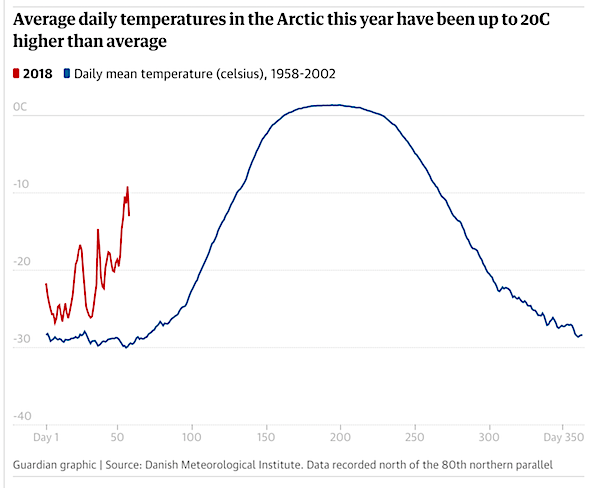
“This is an anomaly among anomalies. It is far enough outside the historical range that it is worrying – it is a suggestion that there are further surprises in store as we continue to poke the angry beast that is our climate,” said Michael Mann, director of the Earth System Science Center at Pennsylvania State University. “The Arctic has always been regarded as a bellwether because of the vicious circle that amplify human-caused warming in that particular region. And it is sending out a clear warning.” Although most of the media headlines in recent days have focused on Europe’s unusually cold weather in a jolly tone, the concern is that this is not so much a reassuring return to winters as normal, but rather a displacement of what ought to be happening farther north.
At the world’s most northerly land weather station – Cape Morris Jesup at the northern tip of Greenland – recent temperatures have been, at times, warmer than London and Zurich, which are thousands of miles to the south. Although the recent peak of 6.1C on Sunday was not quite a record, but on the previous two occasions (2011 and 2017) the highs lasted just a few hours before returning closer to the historical average. Last week there were 10 days above freezing for at least part of the day at this weather station, just 440 miles from the north pole.
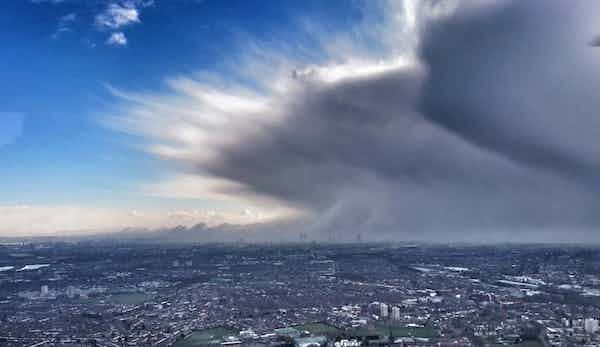
Snowstorm nears London Photo: NPAS










